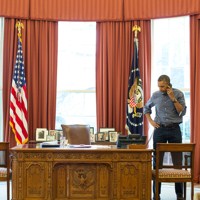Will Vladimir Putin or Barack Obama ultimately benefit most from the crisis in Ukraine? Most pundits are betting on the former. The Russian president has pulled off a bravura display of ruthless guile in seizing control of Crimea. His American counterpart has looked limited, calculating that Moscow will want an “off ramp” out of a crisis that currently seems to be going Moscow’s way. Obama’s critics have naturally attributed Putin’s aggression to U.S. weakness, even though Washington has pushed for sanctions and other punitive measures. But Obama may emerge as the final winner.
This is not because Russia will let the Crimea go. Moscow’s de facto annexation of the Ukrainian territory is a fierce blow to both the fragile new authorities in Kiev and the post-Cold War European settlement. But Putin will now face blowback from his actions, and this potentially favors the U.S. on four strategic fronts: Europe, the Middle East, relations with China and the balance of power with Russia itself.
The crisis may allow the Obama administration to erase past foreign policy errors, some of which have involved overinvestment in ties with Russia. In his first years in office, Obama appeared bored by Europe and willing to discount Eastern European NATO members’ security concerns in order to foster better ties with Moscow and facilitate the “pivot” to Asia. The Libyan war highlighted trans-Atlantic and intra-European differences. There have been echoes of these frictions in recent weeks as Germany has questioned Washington’s gradual shift toward a hard line on Ukraine.

